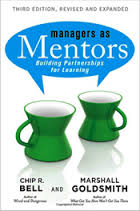Review: Managers as Mentors by Chip Bell and Marshall Goldsmith
Tanmay Vora
 For thousands of years in India, there prevailed a tradition of “Guru-Shishya” – mentor and protégé in other words. In this relationship, which was a primary form of education then, powerful and subtle knowledge was conveyed to protégé on a one-on-one basis in an environment of complete trust, dedication and intimacy. As realization grew, the protégé would extend his lessons to others and so, wisdom kept flowing across generations.
For thousands of years in India, there prevailed a tradition of “Guru-Shishya” – mentor and protégé in other words. In this relationship, which was a primary form of education then, powerful and subtle knowledge was conveyed to protégé on a one-on-one basis in an environment of complete trust, dedication and intimacy. As realization grew, the protégé would extend his lessons to others and so, wisdom kept flowing across generations.
Cut to the corporate environment today. Ability to provide mentoring is a part of almost every manager’s KRA. They are expected to help people grow and ensure that they learn as they do. Managers are the glue that builds engaged teams in organizations. But the reality is that managers get so engrossed with lines – deadlines and bottom lines – that they forget they also need to help others grow. Sadly, they start looking at people as “resources” to get the job done.
If I were to judge a manager’s performance, I would do so based on two parameters: 1) How effectively do the managers get the job done? 2) While doing so, how much did people in the team grew and learned? To be effective and make a lasting difference, managers have to be mentors first and then guardians of tasks.
Mentoring is an art. This week, Chip R. Bell and Marshall Goldsmith released the revised edition of their classic book “Managers as Mentors: Building Partnerships for Learning” which I read with great interest. I loved the sub-title which says it all. Mentoring is the highest form of teaching and every manager who wants to make a difference in their people’s lives will find this book useful. I was reminded of the powerful tradition of “Guru-Shishya” while reading parts of this book.
The book starts with a section that defines mentoring. It says,
“At a most basic level, it is simply the act of helping another learn”…“Mentors” are people (especially leaders) who engage in deliberate actions aimed at promoting learning.”…”Bottom line, a mentor is simply someone who helps someone else learn something that would have otherwise been learned less well, more slowly, or not at all.”
The book then goes on to provide practical ideas and case studies that can help any manager in mentoring their team members effectively and thereby build an engaged and connected team that delivers results and grows. I also loved the useful tools (book has an entire mentors toolkit section) like self-check scale for a mentor which helps you assess your own aptitude to mentor others.
On a long run, a manager’s real legacy is not the projects executed, but difference made in the lives of other people. People already have potential hidden (like gold dust within the sand) and a mentor’s job is to help a protégé so that the gold surfaces. It is about gently and constantly pushing them towards higher plane of possibilities and learning.
Learning and extending that learning to others in an organization is not a “feel-good-nice-to-have” thing – it is a competitive strategy that helps in innovation, improvement and growth.
– – – – –
Stay Tuned: Subscribe via RSS, Connect via Facebook or Follow us on Twitter. You can also subscribe to updates via email using the section at the bottom of the page.
– – – – –
Also read: Other Book Reviews at QAspire Blog